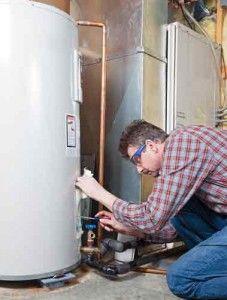How much do you know about your water heater? You probably know that it is an essential piece of household equipment, but do you know how it works, or what type you have, or what you should do if your system experiences a problem? When your water heater is functioning well, you probably don’t think about it at all; this is natural. However, when you wake up to that cold shower, you’re going to want answers. Keep reading for our responses to the most frequently asked questions about water heaters, and remember that All City Plumbing, Air & Electrical is available for all your water heater needs.
The Top 5 Water Heater FAQs
- How Many Different Types of Water Heaters Are There? There are two main types of water heaters: traditional tank water heaters and tankless systems. Within these two categories, there are more types based on fuel source, i.e. gas-powered water heaters and electric water heaters. Traditional water heaters store your water in a tank, using a heating element to warm it up again and again whenever you turn on the tap. With tankless systems, water is heated as it moves through your pipes, so it is already warm by the time it gets to you.
- Which Type of Water Heater Is Best? There is no one type of “best” water heater—just the water heater that is best for your home. Traditional water heaters hold a lot of appeal because they areeasy to install,have very little upfront cost, and are affordable to repair. Tankless heaters, on the other hand, tend to be more expensive to install and can cost a lot of money to fix if something goes wrong. However, tankless systems are far more energy-efficient than traditional water heaters, as they do not have to heat up your water again and again every time you turn on the tap. They also break down less frequently, have longer lifespans, and require less maintenance and fewer repairs. The biggest advantage of tankless systems though is that they are designed to supply hot water on-demand, with no wait time.
- What Is the Right Size Water Heater for Me? The size of your water heater is directly proportional to the size of your house. If you live in an apartment or a smaller home, i.e. 2-3 people, you will probably be fine with a smaller water tank—something in the 23-36 gallon range. However, if you live in a big home with four or more people, you will probably need a water tank that holds at least 56 gallons at a time. Tankless systems, meanwhile, are always fairly small in size, which is part of what makes them so convenient to access. Therefore, it’s not the size of the unit itself that’s important when it comes to tankless systems, but the speed at which the system can dispense water, also known as the flow rate. Flow rate is measured in gallons per minute, or GPM, so if you live in a smaller home, you should look for a tankless system with a lower GPM, and if you live in a larger house, you should look for a GPM rate that is high. Traditionally tankless systems were not thought to be a good option for larger homes, given the difficulty they have supplying water to multiple taps at once. However, thanks to advances in modern technology, more and more people in large houses are starting to install tankless water heaters, too.
- When Should I Replace My Water Heater? You should plan on replacing a traditional water heater every 10-15 years. Tankless systems can last longer, and should be replaced roughly every 20 years. If you do not know how old your water heater is, you can find out by looking for the serial number on the unit.
- How Do I Increase My Water Heater’s Lifespan? If you want your water heater to work better and last longer, the best thing you can do is remember to call for periodic water heater maintenance. There are a few simple tasks you can perform on your own, like flushing out your tank periodically (assuming you have a traditional system,) replacing your anode rod to prevent sediment and bacteria build-up, and even installing a water softener to reduce the presence of hard, minerally water. That said, you should never ignore the signs that your water heater needs professional service. Watch out for increasing utility bills, strange smells/noises coming from your system, and sudden loss of water temperature or pressure, and don’t hesitate to call All City Plumbing, Air & Electrical anytime.
All City Plumbing, Air & Electrical is available by phone at (909) 552-7550, or you can send us a message online.
